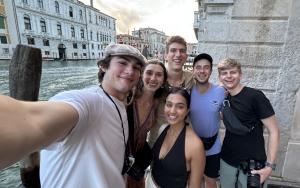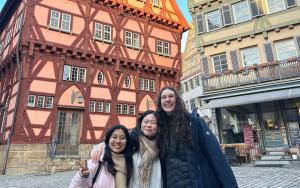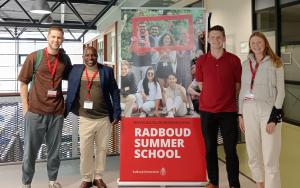#MatiesAbroad FAQ and Resources
Below you’ll find answers to frequently asked questions from SU students, as well as helpful resources which may assist you as you explore study abroad opportunities.
- Are there financial support available for students studying abroad?
- Do you provide full funding for study opportunities?
- I want funding for a Contiki tour, can I apply for funding?
- I would like to apply for funding for an international co-curricular opportunity. Where can I apply?
- Is study abroad affordable?
- Where can I find information about funding for doing a full degree abroad?
Yes, there is financial support available for registered Stellenbosch University students.
Our focus is on co-funding, not full funding.
Stellenbosch University and its partner universities are committed to limiting the financial costs incurred by students who participate in exchanges. For this reason, travel bursaries, tuition waivers and other benefits (where applicable and possible) are provided and negotiated. It is however important to note that students will also need to make a financial contribution towards their own respective study trip. In many cases it is only to cover living expenses, extra travel expenses, administrative costs and to comply with visa requirements.
It is also important that you discuss your decision with your parents, guardians or financial benefactors. Be open about your financial situation with SU International, so that we can guide you to the best of our ability.
Bridging Funding: Exchange students should be mindful that scholarships from the host universities might not pay out immediately on arrival. For that reason, it is a suggested to have bridging funding in place, which a student can fall back on in case a scholarship is not paid out on arrival.
Start-up Funds: There are initial administrative costs (for example visa costs etc.), which are not necessarily covered by the exchange bursary, or the scholarship provided by the host university.
No, funding will only be provided for approved academic excursions.
The funding options available through SU International are limited to academic related activities. You can, however, apply for funding from the Stellenbosch University Co-curricular Support Fund (SUSCF).
It can be affordable, but at the same time it can also be expensive. To a large extent it depends on the choices you make, specifically in regards to the choice of host institution or summer school programme. Some semester exchanges and summer school programmes are better funded through scholarships and waivers; so it is important to do your homework and choose the option that fits best with your financial needs and position.
You can find some links to resources on our blog; visit also the designated website for international scholarships by the Department of Education and Training.


- I want to do a full degree abroad, what do I need to do?
- I would like to go abroad, what do I need to do?
- What is the chances of my application being successful?
- Must you be a South African citizen to be able to make use of the opportunities coordinated by SU International?
- My marks are not good, can I go abroad?
Our focus is on in degree mobility, for example exchanges and summer schools (or other short term options). We can steer you in the right direction, but that is not our main business. Also, when you are doing a full degree abroad you are not a registered student at Stellenbosch University any more, which means that you don’t qualify for funding or for other support. A good resource for full degree postgraduate studies is StudyPortals.
You have taken the first step – but now you need to be more specific. I can’t answer your question before you provide me with more information. For how long do you want to go? When do you want to go abroad? Where do you want to go? These are questions that you need to answer before you can really answer “What do I need to do?”.
You will never know until you apply, but make sure that you comply with the requirements. Take the following words to heart: …anyone can cook, but the only the fearless can be great.”
No, you don’t have to be a South African citizen to study abroad through SU International. It is just important that you are registered for a full degree at Stellenbosch University and comply with the other specified requirements. Certain scholarship programmes like for example the Erasmus Mundus scholarship programme has specific requirements in terms of citizenship.
All students who wish to be considered for a semester exchange must have completed at least 2 semesters or 1 academic year at SU, with a weighted average of 65% and above. In the case of ECP students they should have completed at least 4 semesters or 2 academic years at SU with a weighted average of 65%. If students do not meet these requirements the application will be unsuccessful.
Yes, you are. We will provide assistance and guidance, but at the end of the day it is your responsibility to make sure that you get the necessary signatures of the respective professors.
There are many factors that you should take in consideration when making a decision about a partner institution; generally, the most important ones are the following:
Academics: If you need to transfer credits back to Stellenbosch University, you need to identify an institution which offers equivalent or similar courses (content / credit weight etc. ) to those on offer at Stellenbosch University. The same principle counts for going on exchange for research purposes. You will not be able to do research at an institution which does not have the research capacity or skills to accommodate you.
Language: It is important to enquire about the language of tuition. If you can’t speak German, there is no point in applying for courses being presented in German.
Finances: If you need financial support to go abroad, it is important to look at options where additional funding is available. That could be in the form of a housing scholarship or a monthly stipend. Inform the exchange coordinator if you are depended on funding.
Yes. It is your responsibility to ensure that your registration is current and up to date. You have to be enrolled for the full duration of your exchange.
There could be various reasons for this happening. It could be that the host institution can’t accommodate exchange students for the respective semester or that we feel that other institutions are a better fit in terms of your studies. It is also important to note that the application process is competitive and you are competing against other students. There are also other institutional considerations that could affect your placement. Because of this it is important that all three institutions indicated by you are equally preferred options.
The partner university or summer school will provide assistance in terms of finding appropriate accommodation. Please follow the requirements and suggestions they provide. In most cases accommodation can only be booked after you have been accepted by the host institution or summer school.


- Are there costs involved with a visa application?
- Can I apply for a visa before I get accepted at the host institution?
- Can SU International ask that a visa application be speeded up?
- Do I need a passport if I want to study abroad?
- Do I need a visa?
- I want to apply for a passport, can you help me?
- I want to immigrate, can you help me?
- Should I have a passport by the time I apply for a study abroad opportunity?
- What type of visa do I need?
Normally there are costs involved. The costs could consist of a processing fee, but also proof of financial means. Countries normally like to make sure that you have enough funds available to cover living and other expenses. You also have to take in consideration that there are also transport costs to and from the embassy or consulate, or possible courier costs (DHL, Fedex etc.).
No, but you can check the requirements beforehand and start making the necessary arrangements to acquire the required documents. The letter of acceptance from the host importance is very important, and you can’t apply without this letter. The letter normally specifies the period of when you will study at the host institution, as well as information about accommodation and scholarships.
Unfortunately not. For that reason it is important to plan appropriately and make sure that you leave enough time for the visa application. Refer to the recommendations of the embassy or general consulate.
Yes, you do. You need to apply for a passport at the Department of Home Affairs.
It depends on the country which you will be visiting and also what is the purpose of your visit. Always consult the local representative of the respective country, namely the embassy or consulate general in South Africa. Don’t rely on hearsay or advice from your friends – find out the information yourself.
No, you need to go to the Department of Home Affairs and follow their instructions. Visit their website, it is possible to submit an application online.
It is preferred, but it is not the end of world if you don’t have a passport. Just make sure to apply immediately, so that by the time the outcome of the application is announced you can start with the visa application process.
Consult the local representative of the respective country you will be visiting, namely the embassy or consulate general in South Africa. But in many cases the type of visa you need to apply for depends on the purpose of your visit and the length of your visit.
Contact Person:

